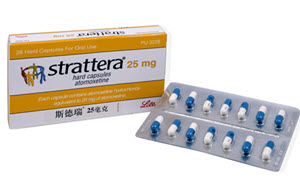 Type: ADHD medication
Type: ADHD medication
Active ingredient: atomoxetinhydroklorid (atomoxetine)
Common use: Strattera affects chemials in the brain and nerves that have an impact on hyperactivity and impulse control. Strattera is chiefly used to treat attention deficit hyperactivity disorder (ADHD).
How to use: Unless otherwise ordered by your doctor, take Strattera with a glass of water. If you take Strattera once a day, take the dose in the morning. If you take Strattera twice a day, take one dose in the morning and one dose late in the afternoon.
To not take a capsule of Strattera that has been opened or broken.
The medicine inside a capsule of Strattera can be dangerous if you get it into your eyes. If this happens, rinse your eyes thoroughly with water and seek medical attention.
If you miss a dose of Strattera, take it as soon as possible. If it is almost time to take your next dose, skip the missed dose permanently and stick to your regular dosing schedule. Do no take two doses at once or near each other in time.
Strattera must be taken regularly to work as intended. Make sure you refill your prescription before you run out of Strattera.
How to store: Store Strattera at room temperature in a tightly-closed container, and keep away from heat, light and moisture.
Warnings:
- Do not take Strattera if you have narrow-angle glaucoma, high blood pressure, heart disease, or a history of pheochromocytoma (tumor of the adrenal gland).
- Do not take Strattera if you have used an MAO inhibitor during the last 14 days. Examples of MAO inhibitors are phenelzine, rasagiline, isocarboxazid, linezolid,selegiline, and tranylcypromine.
- It is important to tell your doctor your full medical history and your current health status, including any medical treatments or medicines that you use regularly or occasionally. Examples of health issues that are especially important to inform you doctor about are liver disease, heart disease (including heart attack, heart rhythm disorder, congenital heart defects, and coronary artery disease), and bladder obstruction or other urination problems.Your doctor also needs to known if you or anyone of your reasonably close relatives have died (or nearly died) from a sudden heart problem, or have a history of depression, bipolar illness, psychosis, suicide attempt or other type of mental illness.
- Strattera can cause aggressive and hostile thoughts and behaviors, as well as mood changes, confusion, hallucinations and suicidal thoughts. If you experience this type of symptoms, contact your doctor.
- Seek medical attention if you experience chest pain, shortness of breath, fast heartbeats, uneven heartbeats, increased blood pressure, severe headache, blurred vision, buzzing in your ears, seizure, lightheadedness, painful urination, difficult urination, painful erection, or an erection that lasts more than 4 hours.
- Contact your doctor if you develop any signs of liver problems, such as yellowing of the skin, yellowing of the eyes, itchiness, loss of appetite, dark urine, clay-colored stools, upper right-sided abdominal tenderness, and flue-like symptoms.
- Strattera may impair your thinking or reactions. Do not drive, operate machinery or do anything else that could be dangerous until you know how you react to Strattera.
- Seek immediate medical help if you develop any symptoms of an allergic reaction to Strattera, such as difficulty breathing, swollen face, swollen lips, swollen tongue, swollen throat or hives.
- Do not take any medication (prescription medication, over-the-counter medication or alternative medication) without checking with your doctor first, since Strattera may interact with certain medications.
- Long-term use of Strattera in a child can slow the child’s growth.
- It is unknown if Strattera is safe during pregnancy.
- It is unknown if Strattera is excreted into breast milk.
- Symptoms of an Strattera overdose include drowsiness, stomach problems, blurred vision, dry mouth, fast heartbeat, agitation, hyperactivity and unusual behavior.
Examples of reported side-effect of Strattera:
- Urinary retention
- Urinary hesitation
- Dysuria
- Dysmenorrhea
- Delayed menses
- Irregular menstruation
- Menstrual disorder
- Abnormal orgasm
- Erectile disturbance
- Ejaculation failure
- Ejaculation disorder
- Impotence
- Prostatis
- Priapism
- Hemospermia
- Pelvic pain in men
- Libido changes
- Increased heart rate
- Increased blood pressure
- Palpitations
- Tachycardia
- Orthostatic hypotension
- Raynaud’s phenomenon
- QT prolongation
- Dry mouth
- Nausea
- Constipation
- Abdominal pain
- Dyspepsia
- Vomiting
- Flatulence
- Sinusitis
- Sinus headeache
- Headache
- Myalgia
- Insomnia
- Dizziness
- Paraesthesia
- Somnolence
- Tremor
- Abnormal dreams
- Aggression
- Hostility
- Suicidal thoughts
- Increased sweating
- Dermatitis
- Rash
- Mydriasis
- Decreased appetite
- Weight loss
- Fatigue
- Hot flushes
- Pyrexia
- Rigors
- Chills
